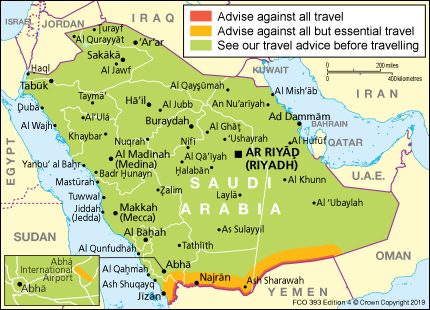
The Foreign and Commonwealth Office (FCO) advise against all travel to within 10km of the border with Yemen.
The FCO advise against all but essential travel to:
- areas between 10km and 80km from the border with Yemen
- Abha International Airport and its grounds, located in Asir province
If you’re currently in an area where the FCO advise against all but essential travel, you should consider whether you have an essential reason to remain. If you don’t, you should leave the area.
Following the death of Iranian General Qasem Soleimani in a US strike in Baghdad on 3 January, British nationals in the region should remain vigilant and keep up to date with the latest developments, including via the media and this travel advice.
Saudi Arabia has been leading coalition air strikes in Yemen since 2015, following a request for support from President Hadi to deter continued Houthi aggression. Clashes along the Saudi-Yemeni border continue, resulting in both military and civilian casualties.
Missiles, unmanned aerial systems (drones) and water borne IEDs continue to be launched against Saudi Arabia, targeting critical national infrastructure, including aviation interests and oil infrastructure. Many of these have been intercepted and destroyed by Saudi air defence systems.
Attacks against critical national infrastructure are likely. Abha International Airport (Asir province) has been the target of a number of attacks in 2019. Attacks have resulted in injury to civilians and the death of one. On 14 September, Aramco facilities, Abqaiq and Khurais, were hit by drones and missiles.
Attacks may be made on other locations in Saudi Arabia, including Riyadh and Jeddah, and along the Red Sea coast. There have been 6 intercepted missile attacks over Riyadh since the first missile attack on 4 November 2017, the most recent on 24 June 2018. In the event of a missile attack, you should stay indoors, monitor local media reports and follow the advice of the local authorities.
All visitors, including pilgrims, need a visa to enter Saudi Arabia.
Saudi Arabia has suspended diplomatic relations with Qatar. All air and sea points of entry between Saudi Arabia and Qatar were cut on 6 June 2017. If you have a query relating to travel plans, contact your airline or tour operator. There are further restrictions on travel and residence affecting Saudi Arabian and Qatar nationals.
Public demonstrations are illegal in Saudi Arabia. Follow local media and be alert to local and regional developments which might trigger public disturbances. Despite warnings issued by the authorities, demonstrations do take place from time to time. You should avoid protests or demonstrations.
Terrorists are likely to try to carry out attacks in Saudi Arabia. Attacks can be indiscriminate, including in places visited by foreigners. Opportunistic attacks on Saudi or western targets are also possible. You should be vigilant and follow the advice of the local authorities.
There’s a heightened risk of terrorism against aviation interests. Additional security measures have been in place on flights departing from Saudi Arabia to the UK since March 2017. You should co-operate fully with security officials. Restrictions on carrying large electronic devices in the aircraft cabin on these flights have now been lifted.
Each year around 3.7 million pilgrims participate in the Hajj. If you’re travelling to Saudi Arabia to take part in the Hajj or Umrah, read the information and advice in the Pilgrimage and Health sections of this travel advice.
Consular support is severely limited in parts of Saudi Arabia where we advise against travel, and limited in the areas we advise against all but essential travel.
Cases of Middle East respiratory syndrome coronavirus (MERS-CoV) in patients from Saudi Arabia continue to be reported to the World Health Organization.

